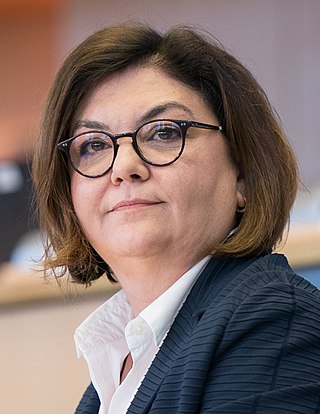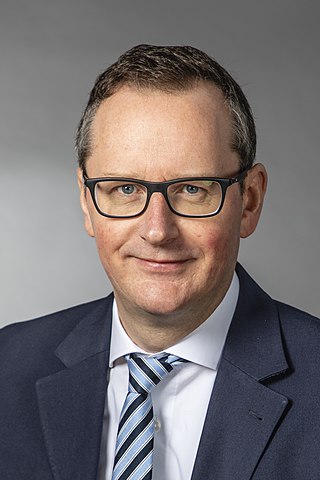
The president of the European Commission, also known as president of the College of Commissioners or prime commissioner, is the head of the European Commission, the executive branch of the European Union (EU). The president of the commission leads a cabinet of commissioners, referred to as the college. The president is empowered to allocate portfolios among, reshuffle, or dismiss commissioners as necessary. The college directs the commission's civil service, sets the policy agenda and determines the legislative proposals it produces. The commission is the only body that can propose, or draft, bills to become EU laws.

Markus Pieper is a German politician and member of the European Parliament for Germany. He is a member of the Christian Democratic Union, part of the European People's Party.

Elisa Maria da Costa Guimarães Ferreira, GCC is a Portuguese politician and economist who has served as the European Commissioner for Cohesion and Reforms in the administration of President Ursula von der Leyen between 2019 and 2024. She previously served as vice-governor of the Bank of Portugal from 2016 until 2019. She was as Member of the European Parliament (MEP) for the Socialist Party; part of the Party of European Socialists between 2004 and 2016. In 2019, she was selected by Portugal to serve as a European Commissioner. Previously, she was in charge of the Ministries of Environment (1995-1999) and Public Works (1999-2001) during the governments of António Guterres.

Ursula Gertrud von der Leyen is a German politician, serving as the 13th president of the European Commission since 2019. She served in the German federal government between 2005 and 2019, holding positions in Angela Merkel's cabinet, most recently as federal minister of defence. She is a member of the centre-right Christian Democratic Union (CDU) and its affiliated European political party, the European People's Party (EPP). On 7 March 2024, the EPP elected her as its Spitzenkandidat to lead the campaign for the 2024 European Parliament elections. She was re-elected to head the Commission in July 2024.

Adina-Ioana Vălean is a Romanian politician who has been serving as European Commissioner for Transport under the leadership of President of the European Commission Ursula von der Leyen from 2019 until June 2024. She served as a Member of the European Parliament from 2007 until 2019, where she chaired of the European Parliament Committee on Industry, Research and Energy in 2019. In the 2024 European elections she was again elected and became a member of the European Parliament.

Carsten Schneider is a German politician of the Social Democratic Party (SPD) who has been serving as a member of the German Parliament since 1998. Since 2021, he has also been serving as Parliamentary State Secretary for East Germany and Equivalent Living Conditions in Chancellor Olaf Scholz's cabinet.

Theresa Reintke is a German politician who has been serving as a member of the European Parliament from Germany since 2014. She is co-president of the Greens/EFA Group in the European Parliament. She is a member of the Alliance 90/The Greens, part of The Greens–European Free Alliance. From 2011 to 2013 she was the spokesperson of the Federation of Young European Greens.

Jakob von Weizsäcker is a German economist and politician of the Social Democratic Party (SPD) who has been serving as State Minister of Finance in the government of Minister-President of the Saarland Anke Rehlinger since the 2022 state elections.

Pierrette Gabrielle Herzberger-Fofana is a German-Malian politician of Alliance 90/The Greens and member of the European Parliament.

The von der Leyen Commission was the European Commission in office from 1 December 2019 to 30 November 2024. It consisted of one commissioner from each of the member states of the European Union – including Ursula von der Leyen, its president, who is from Germany.

The 2024 European Parliament election was held in the European Union (EU) between 6 and 9 June 2024. It was the tenth parliamentary election since the first direct elections in 1979, and the first European Parliament election after Brexit. A total of 720 Members of the European Parliament (MEPs) were elected to represent more than 450 million people from 27 member states. This election also coincided with a number of other elections in some European Union member states.
The Conference on the Future of Europe was a proposal of the European Commission and the European Parliament, announced at the end of 2019, with the aim of looking at the medium- to long-term future of the EU and what reforms should be made to its policies and institutions. It is intended that the Conference should involve citizens, including a significant role for young people, civil society, and European institutions as equal partners and last for two years. It will be jointly organised by the European Parliament, the EU Council and the European Commission. On 19 April 2021, the multilingual digital platform of the Conference futureu.europa.eu was launched.

Lars Patrick Berg is a German politician who was serving as a Member of the European Parliament from 2019 to 2024. He was elected with the Alternative for Germany; he left the party and the Identity and Democracy group in the European Parliament to join the European Conservatives and Reformists in June 2021 and the Liberal Conservative Reformers party in Germany in July 2021. In January 2023 he left the Liberal Conservative Reformers party and joined the Bündnis Deutschland party. He was a member of the state parliament of Baden-Württemberg from 2016–2019.

Markus Buchheit is a German politician who is serving as an Alternative for Germany Member of the European Parliament.

Hildegard Bentele is a German politician of the Christian Democratic Union (CDU) who has been serving as a Member of the European Parliament since 2019.

Stefan Heinrich Berger is a German economist and politician of the Christian Democratic Union (CDU) who has been serving as a Member of the European Parliament since 2019. He is part of the group of the European People's Party. Previously, he was a member of the State Parliament of North Rhine-Westphalia.

Jutta Paulus is a German politician Bündnis 90/Die Grünen and natural scientist, as well as former managing director of the laboratory LAUS GmbH in Kirrweiler/Pfalz. Since 2019, she is a Member of the European Parliament for Greens/EFA. Politico Europe magazine ranks Paulus among the most important politicians and policy makers in the European Union in the implementation of the European Green Deal.
Ramona Strugariu is a Romanian politician of REPER and previous member of USR PLUS/USR who has served as a Member of the European Parliament since 2019.

Christian Petry is a German politician of the Social Democratic Party of Germany (SPD) who has been a Member of the German Bundestag since January 2014, representing constituency 298, St Wendel.

Thomas Silberhorn is a German lawyer and politician of the Christian Social Union (CSU) who has been serving as a member of the Bundestag from the state of Bavaria since 2002.

















